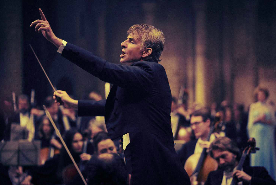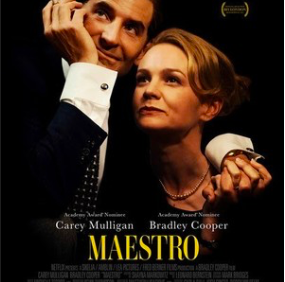FILM REVIEW By CARROLL McCUNE
When Leonard Bernstein received a phone call at nine in the morning from the associate manager of the New York Philharmonic informing him that the aging conductor Bruno Walter was sick and he would have to fill in for him that afternoon, he was only twenty-five years old and hung-over from a night of partying and playing boogie-woogie piano in Greenwich Village.
Bernstein would become the youngest man ever to conduct the Philharmonic. After his electrifying performance conducting without a baton, using only expressive gestures with his hands and body, the audience roared its approval. Newspaper headlines read BOY CONDUCTOR GETS HIS CHANCE. On November 14, 1943, the Maestro was born.
Serge Koussevitzky declared Bernstein to be the first great American conductor. According to his friend and biographer Humphrey Burton he became a “towering musical presence of the twentieth century” for whom music was a “permanent, obsessional necessity.” His popular appeal was heightened by his good looks and blatant sensuality. He was exciting to watch.
Actor/director Bradley Cooper’s impersonation of Leonard Bernstein in his biopic “Maestro” captures the conductor’s sexually charged aura. The second scene in the movie, a flashback, depicts a young Bernstein in bed with his gay lover David Oppenheim (Matt Bomer) when he received the providential phone call.
Cinematographer Matthew Labatique immediately segues to him conducting the Philharmonic— intimating Bernstein’s professed linkage of eroticism with symphonic music. He once characterized the relationship between himself and his orchestra as that of a lover and his beloved.
Cooper’s resemblance to Bernstein was augmented by a prosthetic nose and an uncanny mimicry of his mannerisms, low resonating voice, and upper-class Boston accent. Adding to the difficulty of capturing Bernstein’s inimitable mystique, he had to portray the conductor/composer in several stages of life. Bernstein’s oldest daughter Jamie (Maya Hawke), said, “It’s incredibly strange and disconcerting to have this young movie star portraying our dad at several ages. Bradley portrays my dad when he was in his 20’s, 40’s, and 50’s, and then in his final years, too, so he’s going to be going through many transformations.”
Cooper not only played the lead, but also directed the film, co-wrote the script with Josh Singer, and produced it with Fred Berner, who grew up in New York and went to Bernstein’s televised Young People’s Concerts (1958-1972).
Berner explained: “The guy defied definition and description in every aspect of his life, so the breadth of it seemed deeply theatrical. So, I figured if a movie could embody that kind of voraciousness and commitment to art, and to passion and to love and, ultimately, to family and his own callings and sirens, you know,
that was certainly a character worth exploring and would essentially reflect the times and maybe we could all learn something about ourselves and about how to live a creative life.” (https://www.youtube.com/watch?v=jxPOy-tZ_kc at 1:10 mark)
Motivated by a childhood ambition to become a conductor, Cooper gratefully accepted producer Steven Spielberg’s offer to perform on both sides of the camera. He engaged in extensive preparations learning how to lead a symphony orchestra in Bernstein’s rapturous style. During filming, he was also coached by the opera conductor Yannick Nezet-Seguin who said, “He’s just so convincing. He decided to tackle some of the most difficult music for any professional conductor like Mahler’s Second Symphony.”

JASON MCDONALD/NETFLIX
Classical music aficionados will be disappointed, however, in how little discussion of Bernstein’s own repertoire takes place in the film. Composing was the most important thing in his life, more so than conducting, but Cooper’s biopic focuses mainly on his marriage to the beautiful Chilean actress Felicia Montealegre (Carey Mulligan). While biographical movies often feature one aspect of their subject’s life or just a single event, Bernstein’s marriage was not a determinant of his enormous popularity or singular influence on American music. Moreover, his personal life was defined by his bisexuality and preoccupation with Jewish thought and liturgy (both parents were Ukrainian Orthodox Jews).
According to Bernstein’s oldest daughter Jamie, her father failed both his wife and children in critical ways, although characterized as a loving husband and devoted family man in “Maestro.” She described her father as an obnoxious know-it-all and accused him in her 2018 book “Famous Father Girl: A Memoir of Growing Up Bernstein,” of turning his children into pot-smoking neurotics and humiliating his proud, sensitive wife Felicia with a succession of increasingly overt gay love affairs. After Felicia died of lung cancer in 1978, Jamie complained, “As far as our father behaving as any kind of head-of-household, let alone single parent, he couldn’t be counted on for anything at the moment.”
As the director, Bradley Cooper invited Jamie and her siblings Alexander and Nina onto the set and consulted with them. Jamie described watching Cooper’s dramatization of her father’s marriage to Felicia as a “surreal experience.” The filmmakers were deferential to Bernstein’s children (now in their sixties and seventies), who gave them access to their father’s archive and family home.
Although at first skeptical of Cooper’s intention to dramatize the “love story” between their parents, they approved Cooper and Josh Singer’s script after learning it would focus on their mother’s suffering and martyrdom.
The input of Bernstein’s children no doubt contributed to the veracity and depth of the story, but “Maestro” is still a Hollywood style treatment (romance/estrangement/reconciliation in three acts) of a marriage that, in the opinion of the couple’s close friends, was based on friendship rather than romance.
His biographers speculate that Bernstein married in order to hide his attraction to men in an era when homophobia went unchecked. In Jamie’s memoir, she claimed that the romance between Lenny and Felicia was over before the end of the honeymoon. Felicia, an aspiring actress, hated her role as Mrs. Maestro and was crushed by her husband’s bisexual infidelities.
The plot sequences in the movie jump chronologically. In the beginning, the couple is blissfully in love with a growing happy family, then it cuts to Bernstein at age thirty-seven when he realized that he is still in love with David Oppenheim and tells Felicia, “I’m sad, darling, and I don’t know why.” In another scene, Bernstein’s sister Shirley tells Felicia, “There’s a price for being in my brother’s orbit.”
After another fast-forward in time, the children are grown and Lenny muses that “man is a trapped animal.” He reveals his depression about having to live a double life. Felicia becomes suicidal over her sacrificed career and the fifty-three-year-old Lenny’s new affair with his twenty-four-year-old assistant Tommy Cothran (Gideon Glick). She turns her back on him while he is being swarmed after a concert and walks slowly out of the theater.
Then a climactic scene at home where Felicia expresses profound contempt for her husband, predicting, “If you’re not careful, you’re going to die a lonely, old queen!” They part company and Felicia restarts her acting career, but Lenny descends into an unabashedly profligate sex and drugs spree. They reconcile after Bernstein’s grand performance conducting Mahler’s Second Symphony, but Felicia receives a cancer diagnosis that plunges the whole family into despair. After her death, Lenny asserts, “I have to live the rest of my life exactly as I please.”
Matthew Libatique shot the opening scenes in black-and-white, splitting the cinematography into two halves; the first part pictured the early years in monochrome and the later years in color. This was Cooper’s decision, reasoning that black-and-white was how we viewed life on the screen in the 1940’s and 50’s. Although some film theorists speculate that viewing black-and-white imagery replicates a dream-like state of mind with a direct line into the subconscious; therefore, enhancing a film’s power to mesmerize.
Does this movie teach us how to live a “creative life” as producer Fred Berner hoped? No. Does it enhance our admiration of the Maestro? No. No one would call this movie a tribute to Leonard Bernstein; it’s an artful examination of his marital discord and inner despair. Certainly, Carey Mulligan’s role as Felicia carries the emotional heavy lifting in the film. We see Lenny through her eyes, and we suffer with her; but we can also feel Leonard Bernstein’s veritable presence in “Maestro” by his own music resonating in the soundtrack. It is his music, after all, that defines him.
“Maestro” is available now on Netflix. Rated R for profanity and drug use.
Listen to Steven Spielberg and Bradley Cooper discuss “Maestro.”


